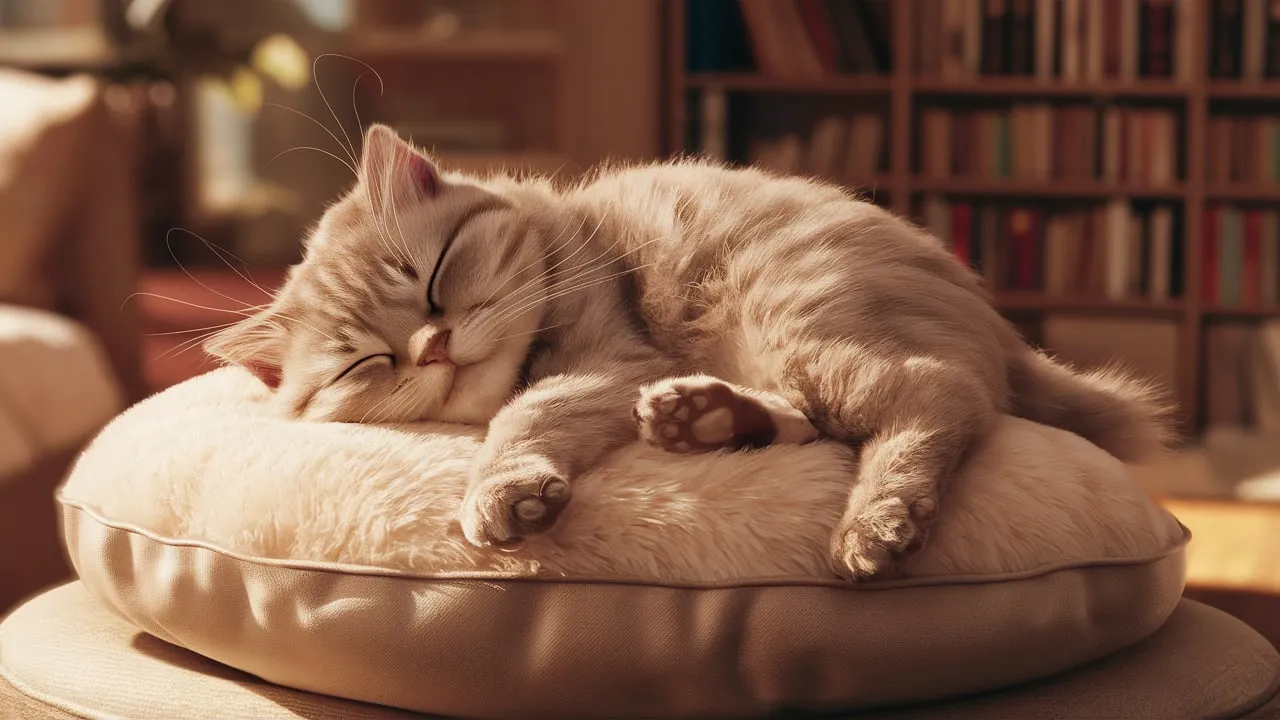As devoted cat owners, we often find ourselves captivated by our feline companions’ quirky behaviors, especially during their slumber. One such intriguing phenomenon is cat twitching when sleeping. This seemingly random movement can spark curiosity and even worry in some owners.
With information of In For Cat. While it might seem alarming at first, cat twitching during sleep is usually a normal and harmless behavior. It’s often a sign of a healthy and active mind, reflecting the complex world of dreams experienced by our furry friends.
Understanding Cat Sleep
Cats are known for their unique sleep patterns. They spend a significant portion of their day napping, often in various positions and with surprising movements.
Stages of Cat Sleep
Like humans, cats experience different stages of sleep:
- Light Sleep: This stage is characterized by relaxed muscles, slow breathing, and twitching of whiskers and paws.
- Deep Sleep: This stage is marked by a deeper state of relaxation, rapid eye movement (REM), and occasional muscle twitches.
Why Do Cat Twitching When Sleeping?

The twitching movements observed during cat sleep are often associated with the REM stage of sleep. During this stage, the brain is highly active, processing memories and emotions, similar to how humans dream.
Possible Explanations for Twitching:
- Dreaming: Just like humans, cats dream during REM sleep. These dreams can involve hunting, playing, or other activities they experience during their waking hours. The twitching movements may be a physical manifestation of their dream activities.
- Muscle Relaxation: During REM sleep, muscle activity is suppressed to prevent the cat from acting out their dreams. However, some muscle groups may still twitch involuntarily, especially those involved in movement and coordination.
- Spontaneous Muscle Activity: Even in deep sleep, some muscle groups might experience spontaneous activity, leading to twitching movements. This is a normal physiological process and not necessarily a cause for concern.
Cat Twitching Vs Seizures
While twitching during sleep is usually harmless, it’s important to distinguish it from seizures. Seizures are more severe and involve uncontrolled muscle spasms, loss of consciousness, and other neurological symptoms.
Distinguishing Twitching from Seizures:
- Duration: Twitching during sleep is usually brief and sporadic, while seizures can last for several seconds or even minutes.
- Frequency: Occasional twitching is normal, but frequent or prolonged seizures should be a cause for concern.
- Other Symptoms: Seizures often involve additional symptoms such as drooling, loss of bladder control, and disorientation.
When To Consult A Veterinarian
Witnessing your cat experience a seizure can be a frightening ordeal. However, it’s important to stay calm and assess the situation. If you notice any of the following signs, seeking veterinary attention is critical:
- Frequent or prolonged seizures: A single, brief seizure might not necessarily be a cause for immediate alarm. However, if your cat experiences frequent seizures (multiple in a day) or if a single seizure lasts for an extended period (more than a few minutes), consulting your veterinarian is essential. They can investigate the underlying cause and recommend appropriate treatment options.
- Twitching with neurological symptoms: Twitching alone might not be a major concern. But if the twitching is accompanied by other neurological symptoms like weakness, loss of coordination, or abnormal eye movements, it could indicate a more serious issue affecting your cat’s nervous system. A veterinary diagnosis can help determine the cause and ensure your cat receives the necessary treatment.
- Behavioral or sleep pattern changes: Changes in your cat’s behavior or sleep patterns can sometimes be subtle. However, if you notice a significant shift, such as increased lethargy, unusual aggression, or difficulty sleeping, it’s worth mentioning to your veterinarian. These changes could be behavioral responses to an underlying health condition.
- Any other concerning symptoms: Ultimately, any symptom that worries you about your cat’s health warrants a consultation with your veterinarian. Trust your instincts – if something feels off, it’s always better to err on the side of caution and seek professional advice. Early detection and diagnosis can make a world of difference in your cat’s treatment and recovery.
FAQs
Q: Is it normal for my cat to twitch when sleeping?
A: Yes, it is normal for cats to twitch when sleeping, especially during REM sleep.
Q: What should I do if my cat is twitching when sleeping?
A: If the twitching is occasional and brief, it’s likely harmless. However, if you’re concerned, consult your veterinarian.
Q: Can I wake up my cat if they are twitching?
A: It’s generally not recommended to wake up a cat during sleep, especially if they are twitching.
Q: What can I do to prevent my cat from twitching when sleeping?
A: You can’t prevent your cat from twitching, as it’s a normal physiological process. However, providing a comfortable and safe sleeping environment can help promote restful sleep.
Conclusion
Cat twitching when sleeping is a common and usually harmless phenomenon. It’s often a sign of a healthy and active mind, reflecting the complex world of dreams experienced by our feline companions. While it’s important to be aware of the difference between normal twitching and seizures, most cases of twitching during sleep are nothing to worry about. By understanding the reasons behind this behavior, you can rest assured that your cat is simply experiencing the natural wonders of sleep.
Remember, if you have any concerns about your cat’s health, always consult your veterinarian. They can provide the best advice and ensure your furry friend receives the care they need.

Related Post
Why Cat Keeps Sneezing But Seems Fine?
Why Does My Cat Bite Me?
Does A Siamese Cat Shed? What You Need To Know